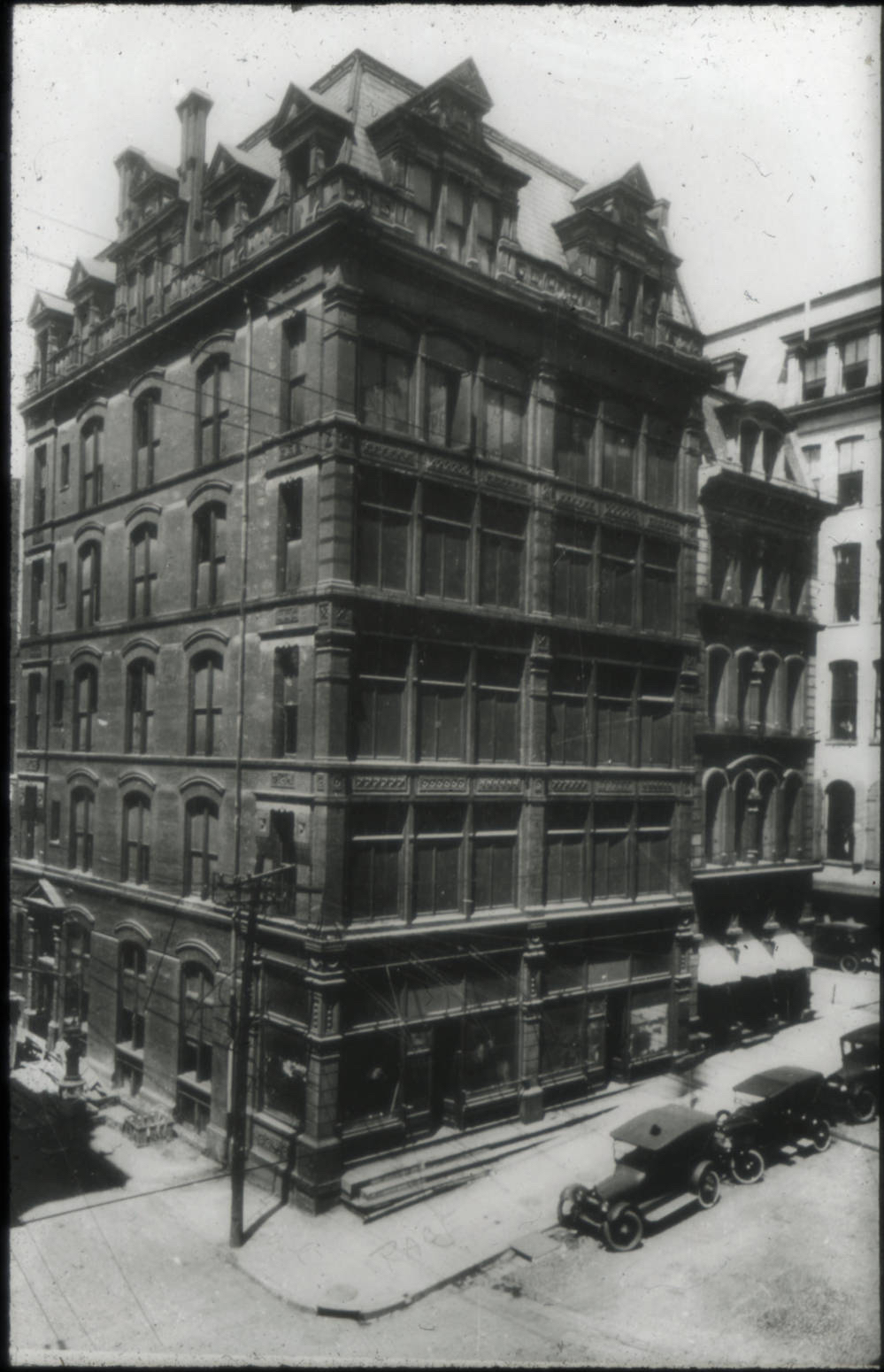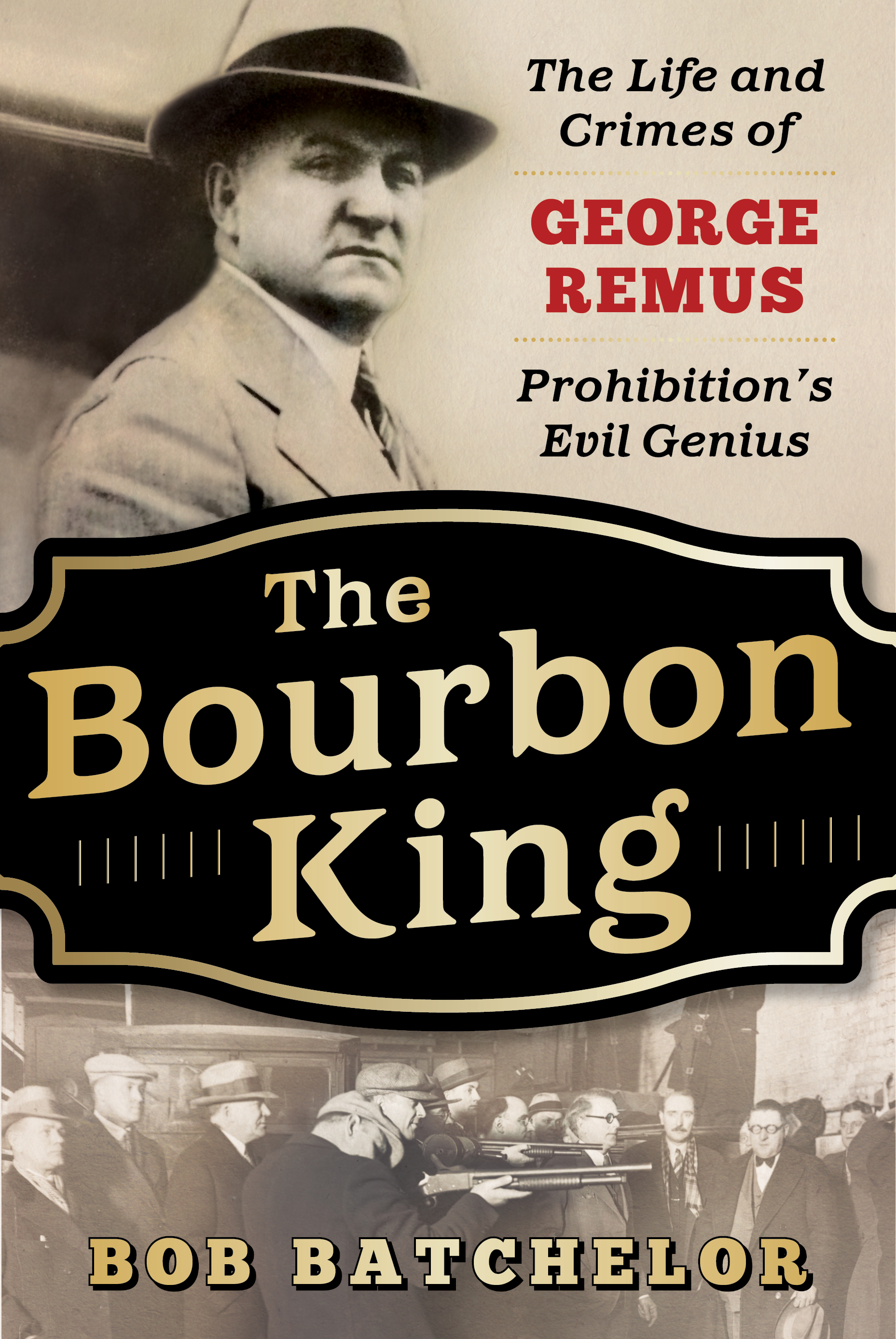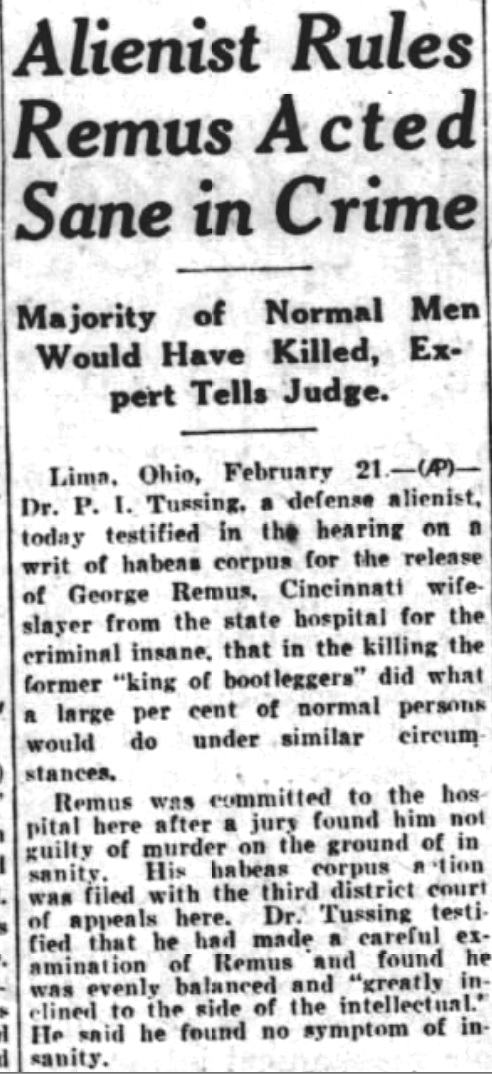Filled with mayhem, mountains of illicit cash, and rivers of bourbon, “Tales of the Bourbon King” presents the life and crimes of George Remus, bootleg king of the Jazz Age, a dazzling true crime spectacle. With gunfights and fisticuffs, he turned America into his violent playground, grafting his way into Warren Harding’s White House. A model for Jay Gatsby, Remus’s story epitomizes the spectacular 1920s – until it came crashing down in an improbable tale of deceit and rage, centered on the dastardly G-man who stole his wife, leading directly to a fateful gunshot that ended her life.
Read moreTHE BOURBON KING NAMED 2020 BEST HISTORICAL BIOGRAPHY
THE BOURBON KING NAMED 2020 BEST HISTORICAL BIOGRAPHY
Cultural Historian Bob Batchelor Wins Independent Press Award® for true crime biography of George Remus, America’s 1920s “Bootleg King”
Cincinnati, May 4, 2020 – Love, murder, political intrigue, mountains of cash, and rivers of bourbon! The Bourbon King: The Life and Crimes of George Remus, Prohibition’s Evil Genius (Diversion Books) by cultural historian and biographer Bob Batchelor is a grand spectacle and lens into the dark heart of Prohibition. As one Jazz Age journalist put it, “Remus was to bootlegging what Rockefeller was to oil.”
Batchelor breathes life into the largest bootlegging operation in America—greater than that of Al Capone—and a man considered the best criminal defense lawyer of his era. Remus bought an empire of distilleries on Kentucky’s “Bourbon Trail” (making billions of dollars in today’s money) and used his other profession, as a pharmacist, to profit from legal loopholes. He spent millions bribing officials in the Harding Administration.
Remus created a roaring lifestyle that epitomized the Jazz Age over which he ruled. F. Scott Fitzgerald used Remus as one of the models for Jay Gatsby in The Great Gatsby (celebrating its 95th anniversary this year). That is, before he came crashing down in one of the most sensational true crime murder cases in American history: a cheating wife, the dastardly G-man who seduced her and put Remus in jail, and the plunder of a Bourbon Empire. Remus later murdered his wife in cold-blood and then shocked a nation winning his freedom based on a condition he invented—temporary maniacal insanity.
The Independent Press Award is an international book competition judged by experts from different functions within the book industry, including publishers, writers, editors, book cover designers, and professional copywriters. Selected award winners and distinguished favorites are based on overall excellence.
In 2020, the Independent Press Award had entries worldwide. Participating authors and publishers reside in countries such as Australia, Brazil, Cambodia, Canada, India, Ireland, Portugal, Sweden, and others. Books submitted included writers located in cities such as Austin to Memphis to Santa Cruz; from Copenhagen to Mumbai; from Albuquerque to Staten Island; from Boise to Honolulu, and others.
“We are thrilled to announce the winners and distinguished favorites in our annual 2020 Independent Press Award. This year included a myriad of excellent independently published books. It is clear that independents are prospering in every corner of the earth. We are so proud to be highlighting key titles representing global independent publishing,” said IPA Awards sponsor Gabrielle Olczak.
For more information please visit independentpressaward.com; and to see this year's list of IPA Winners and Distinguished Favorites, please visit the website pages:
2020 WINNERS:
https://www.independentpressaward.com/2020winners
2020 DISTINGUISHED FAVORITES:
https://www.independentpressaward.com/2020distinguishedfavorites
ABOUT BOB BATCHELOR
Bob Batchelor is a critically acclaimed, bestselling cultural historian and biographer. He has published widely on American culture and literature. In addition to The Bourbon King: The Life and Crimes of George Remus, Prohibition's Evil Genius (Diversion), Bob wrote Stan Lee: The Man Behind Marvel, the first full-scale biography of the Marvel legend. He has also written books on Bob Dylan, Mad Men, John Updike, and The Great Gatsby, among others. His next book is Rookwood: The Rediscovery and Revival of an American Icon--An Illustrated History (September 8, 2020, Rockport/Quarto)
Bob graduated from the University of Pittsburgh with a bachelor's degree in history, philosophy, and political science. He earned an M.A. at Kent State University under the tutelage of the eminent historian Lawrence S. Kaplan. His doctorate is in English Literature from the University of South Florida, where he studied with Phillip Sipiora. He has taught at universities in Florida, Ohio, and Pennsylvania, as well as Vienna, Austria. Bob lives in Cincinnati with his wife Suzette and their teenage daughters.
###
100 Years Ago: Prohibition Becomes Law with Volstead Act
The Hamilton Daily News Announces Passage of “Dry Bill”
On October 28, 1919, the Senate voted to override the veto of President Woodrow Wilson. The United States would become a dry nation after ratification of the law in January 1920.
The Volstead Act, enacted into law on October 28, 1919, defined the parameters of the Eighteenth Amendment. By passing the Volstead Act, Congress formally prohibited intoxicating beverages; regulated the sale, manufacture, or transport of liquor; but still ensured that alcohol could still be used for scientific, research, industrial, and religious practices.
Legal enforcement of Prohibition began on January 17, 1920.
Chicago Tribune Editors Have Fun with a Witty Headline
Why Did the US Go Dry?
Chaos reigned in the early twentieth century. In America, the tumultuous era included millions of immigrants streaming into the nation, and then a protracted war that seemed apocalyptic. The backlash against the disarray sent some forces searching for normality. Liquor was an easy target. Supporters of dry law turned the consumption of alcohol into an indicator of widespread moral rot.
Bob Batchelor, author of The Bourbon King: The Life and Crimes of George Remus, Prohibition’s Evil Genius (Diversion Books) is available for commentary and discussion of Prohibition and the Roaring Twenties. The Bourbon King is the epic tale of “Bootleg King” George Remus, who from his Gatsby-like mansion in Cincinnati, created the largest illegal liquor ring in American history. In today’s money, Remus built a bourbon empire of some $5 to $7 billion in just two and a half years.
October 28, 1919, Headline in the Chicago Tribune
Quotes:
George Remus: “My personal opinion had always been that the Volstead Act was an unreasonable, sumptuary law, and that it never could be enforced.”
George Remus: “I knew it [the Volstead Act] was as fragile as tissue paper.”
F. Scott Fitzgerald: “America was going on the grandest, gaudiest spree in history…The whole golden boom was in the air—its splendid generosities, its outrageous corruptions and the tortuous death struggle of the old America in prohibition.” From the essay “Early Success” (1937)
Bob Batchelor: “Prohibition turned ordinary citizens into criminals. Media attention turned some criminals into Jazz Age icons. At the top of the heap stood those few, like George Remus, who took advantage of the new illegal booze marketplace to gain untold power and riches.”
Bob Batchelor: “During Prohibition, ‘bathtub gin’ often contained substances that were undrinkable at best and deadly at worst. A band of rumrunners selling ‘Canadian’ whiskey were actually peddling toilet bowl cleaner. Tests on booze obtained in one raid revealed that the liquor contained a large volume of poison.”
Bob Batchelor: “Remus may have been singularly violent and dangerous, but his utter disregard for Prohibition put him in accord with how much of American society felt about the dry laws. Within the government, the lack of resolve for enforcing Prohibition started at the top with President Warren G. Harding and his corrupt administration.”
The Bourbon King
“Bob Batchelor’s The Bourbon King: The Life and Crimes of George Remus, Prohibition’s Evil Genius might as well be the outline of a Netflix or HBO series.”
– Washington Independent Review of Books
92 Years Ago Today -- George Remus Murders Imogene in Cincinnati's Eden Park
92 years ago in 1927, George Remus murdered his wife Imogene in Eden Park, just outside Cincinnati.
The gunshot that indian summer morning capped a tumultuous period of mayhem, betrayal, and embezzlement. The subsequent trial would be followed by millions worldwide!
The accompanying February 1928 insanity trial transcripts provide insight into what Remus thought about his wife and the murder.
Below is a portion of the February 1928 insanity hearing transcript. Remus answers questions about his early days with Imogene and admits that they engaged in “illicit relations.”
February 1928 insanity hearing transcript — George Remus answers questions about his early days with Imogene — “illicit relations”
Remus admits that he hoped to catch Imogene and Franklin Dodge together — so he could kill them both!
Remus admits that he hoped to catch Imogene and Franklin Dodge together — so he could kill them both!
George claimed he married Imogene to bring her up from poverty…and that she owed him as a result. The betrayal with Dodge was too much. The affair and that it became common knowledge in the criminal underworld, disgraced him, and — in his mind — forced action.
George claimed he married Imogene to bring her up from poverty…and that she owed him as a result. The betrayal with Dodge was too much…
Given his ability to manipulate juries, Remus declared he would defend himself, giving him direct access to the 12 people who held his life in their hands.
Given his ability to manipulate juries, Remus declared he would defend himself, giving him direct access to the 12 people who held his life in their hands.
5 Minutes to Murder: George Remus, The Bourbon King
5 Minutes to Murder: George Remus, The Bourbon King
Historian Bob Batchelor discusses The Bourbon King outside the former Cincinnati hotel where "Bootleg King" George Remus stalked his wife Imogene, before murdering her in cold blood at Eden Park.
The Bourbon King, The Inside Story: The Chase Leads to Murder, Video!
The Chase Leads to Murder!
From Cincinnati, Historian Bob Batchelor discusses how George Remus chased down his wife Imogene and murdered her in Eden Park while also retracing the route through the city!
The Bourbon King, The Inside Story: Imogene, Femme Fatale or Pawn in Remus’s Evil World?
Imogene Remus sits for a formal portrait in her finest fur shawl and feathered hat. Her stunning diamond wedding ring is prominently displayed, which may indicate that this photo was taken shortly after she and George were married in Newport, Kentucky, on June 25, 1920.
The exterior of the Gatsby-like “Dream Palace.”
Imogene Remus — Femme Fatale or Pawn in Remus’s Evil World?
Imogene Remus is one of the trickiest characters in The Bourbon King.
Imogene’s motivations and subsequent actions enabled her to easily transition to whatever a situation necessitated. Imogene could be browbeaten housewife or femme fatale at a moment’s notice. On one hand, her desires were base and gaudy, but she also masterminded a complex scheme to funnel much of her husband’s wealth to herself and family members.
Unlike other accounts of George and Imogene, my research revealed how devious she had been from the start of her relationship with her husband. Much of Imogene’s early life had never been uncovered, particularly the lengths she went to attract a modicum of fame.
Yet, at the same time, Imogene played a dangerous game, dancing on the edge of a cliff. She may have thought she understood George, but in the end, she had no clue to the depths of violence and anger Remus could unleash.
Imogene grew up in Milwaukee dreaming of a life bigger and more glamorous than her working class roots. What I found in researching her life is that she was constantly playing with her identity by using different names, from “Gussie” and “Gene” to “Susan” and others.
Trying these names and different identities on like masks, Imogene hoped to become wildly famous and rich, living out an aristocratic life that she saw around her. I also uncovered a number of crazy attempts Imogene made to get her name in the newspapers, which was one of the best ways to increase notoriety in the early twentieth century. She would send “news” to reporters, and for someone with no formal training, had several pieces picked up.
For example, around the time the story broke about her breaking up George’s first marriage, using the name “Gene Holmes,” she had a list of tips for a wife to follow to keep her husband from “becoming a wild man.” Reporters who ran the story did not miss the irony of the highly-publicized “love triangle” that had been in the papers for months.
Even more overtly, Imogene told a friend shortly after Remus moved in with her that she planned to “roll him for his roll” and that she “would marry him if I have to” to get his money. George was already famous, flashy, and probably looked like a great catch for Imogene. She won him over and eventually got all the riches in the world. However, she couldn’t have had any idea at that time what a depraved person he would become.
The Bourbon King, The Inside Story: George Remus as a Business Leader
At the height of his power, George Remus purchased an office complex at 225 Race Street on the southwest corner of Race and Pearl Streets, renaming it the “Remus Building.” The lobby tile display (allegedly from the famous Rookwood Pottery) spelled out “Remus,” which he thought demonstrated his authority. For his second-floor office space, Remus spent $75,000 on lavish furniture, accessories, and equipment, as well as a personal chef.
(Courtesy Public Library of Cincinnati and Hamilton County, Cincinnati History Slide Collection)
George Remus as a Business Leader
Remus cashed out in Chicago and took his fat stacks to Cincinnati, the epicenter of the bourbon and beer industries in the early twentieth century. He parlayed his life earnings into a fortune that some estimate reached $200 million, which would be many billions of dollars today over the course of about two and a half years.
Remus realized that he could control every aspect of the bootlegging business, from production to distribution via other rumrunners and liquor operatives, while also selling directly to consumers. He called this idea “the circle,” which was probably modeled on what J. D. Rockefeller had done in the oil business. “Cornering the market” was a popular idea in the 1920s, a decade and a half after President Theodore Roosevelt had criticized business leaders for attempting to create corporate monopolies.
“Remus was to bootlegging what Rockefeller was to oil.”
— Paul Y. Anderson, St. Louis Dispatch
Basically, like Rockefeller in oil or J. P. Morgan in steel, George wanted to create a network that controlled all aspects of the bourbon industry, from creating the product in Kentucky distilleries to shipping and distribution, and then through the sales process. If he controlled all these points—thus creating the circle—he would dominate the market.
Creating this national network took a lot of money and a lot of hubris. Remus had both in spades. He pulled it off, but in the end, faced some of the same challenges businesses have always faced: lack of talent to manage the organization and deals that fell through. Remus needed henchmen that were as smart as him and he had trouble finding them. Then, his “sugaring” network—the term for bribery in the 1920s—fell through. These challenges essentially put him out of business.
Check out The Bourbon King: The Life and Crimes of George Remus, Prohibition’s Evil Genius for the whole story, including how Remus assessed his own abilities as a corporate leader.
Starred Review in Publishers Weekly!
The Bourbon King: The Life and Crimes of George Remus, Prohibition’s Evil Genius received a starred review in Publishers Weekly, one of the essential publications in the publishing industry.
“Larger-than-life characters take the reins of this story, a rip-roaring good time for any American history buff or true-crime fan.”
“Batchelor’s action-packed narrative both entertains and informs with its tales of the corruption of President Warren G. Harding’s attorney general, the bootlegging trade, and the public’s oscillating views of Remus and Prohibition in general.”
You can find the complete review at this link!
George Remus, King of the Bootleggers: Insanity and Murder
George Remus, the former King of the Bootleggers, fought to prove that he was sane in February 1928, two months after a jury declared the murder of his wife Imogene “transitory maniacal insanity” and that he should go free.
Read more













